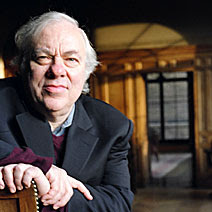Richard Goode. Very Goode.
 Being at WPAS’ Richard Goode Strathmore recital last Sunday night probably meant for many piano lovers the concomitant bemoaning of missing out on Till Fellner’s recital (Charles’ review here). The joy of hearing Goode, one of the finest American pianists (I would even say by acclaim, reputation, and ability the finest), quickly supplanted the grief of missing the most promising of Austrian pianists, though, when the ears fell under the spell of Bach’s Partita No.5 in G-Major, BWV 829. Mr. Goode treated this music very pianistically – that is: he did not try to play it as a transcription from harpsichord. Although generally brisk, except in the Sarabande, he neither eschewed the pedal (subtly used as it was) nor leave the dynamic gradations the piano allows unused. The hummed along Sarabande at the center of the work – gentle and broad – displayed a bit of the romantic side that Bach attains in felt performances on the piano. Not excessively of pensive spiritualness, though neither just an athletic feat, this was good, humorous, joyful Bach that Goode delivered.
Being at WPAS’ Richard Goode Strathmore recital last Sunday night probably meant for many piano lovers the concomitant bemoaning of missing out on Till Fellner’s recital (Charles’ review here). The joy of hearing Goode, one of the finest American pianists (I would even say by acclaim, reputation, and ability the finest), quickly supplanted the grief of missing the most promising of Austrian pianists, though, when the ears fell under the spell of Bach’s Partita No.5 in G-Major, BWV 829. Mr. Goode treated this music very pianistically – that is: he did not try to play it as a transcription from harpsichord. Although generally brisk, except in the Sarabande, he neither eschewed the pedal (subtly used as it was) nor leave the dynamic gradations the piano allows unused. The hummed along Sarabande at the center of the work – gentle and broad – displayed a bit of the romantic side that Bach attains in felt performances on the piano. Not excessively of pensive spiritualness, though neither just an athletic feat, this was good, humorous, joyful Bach that Goode delivered.
Mozart’s A-Minor Rondo KV.511 is an expressive and quietly contemplating Andante that, here, sounded like a continuation of the Bach. Details were pealed out of it with dedication; the mood of the Rondo never allowed to slip into the sentimental or sweetly-sad. Wit and crispness were closer to the surface than any of the projected emotions that many a Mozart piece must so often endure.
Daniel Ginsberg, Richard Goode (Washington Post, February 12) |
The second half was switched from a Chopin assortment to Debussy’s second book of Preludes. It was casually wonderful to hear this pianist’s pianist go through them: profoundly whispered, never hushed, with exceptional ‘diction’ even in the murmuring runs. It sounded the way you expect to hear Debussy played, without knowing that you have these expectations… unobtrusively appropriate and fitting in each prelude. Light, flittering, blistering – whichever was called for. Chopin’s E-flat Minor Nocturne and a Brahms Ballade (118/3?) as encores capped the recital.




















































